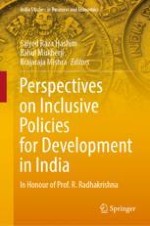2022 | OriginalPaper | Chapter
Governing India: What Do We Know and Need to Know?
Author : Rahul Mukherji
Published in: Perspectives on Inclusive Policies for Development in India
Publisher: Springer Nature Singapore
Activate our intelligent search to find suitable subject content or patents.
Select sections of text to find matching patents with Artificial Intelligence. powered by
Select sections of text to find additional relevant content using AI-assisted search. powered by
